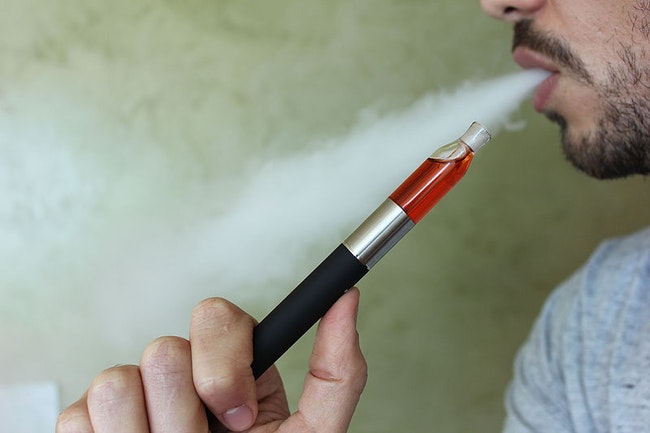 Flavored vape products are banned in Oregon for six months as of Oct. 4, 2019 (Courtesy/Wikimedia Commons)
Flavored vape products are banned in Oregon for six months as of Oct. 4, 2019 (Courtesy/Wikimedia Commons)
SALEM — Oregon Gov. Kate Brown has imposed a six-month ban on the sale of flavored vaping products.
Eight cases of respiratory illness associated with vaping have been reported in Oregon as of Oct. 1.
In two of those cases, the patients died, according to the Oregon Health Authority.
People vape by breathing in and out through electronic cigarettes or vape pens that heat liquid to create a vapor. That liquid can contain nicotine, THC and other ingredients such as flavorings. The industry has been criticized for promoting sweet-flavored products that appeal to children, such as bubble gum and crème brulee flavors.
The ban does not cover unflavored vaping products.
“My first priority is to safeguard the health of all Oregonians,” Brown said in a statement Friday, Oct. 4. “By keeping potentially unsafe products off of store shelves and out of the hands of Oregon’s children and youth, we prevent exposing more people to potentially dangerous chemical compounds, and help lessen the chance of further tragedy for any other Oregon family.”
Brown added that the “safest option” for people right now is stop vaping altogether, in line with what State Health Officer Dean Sidelinger advised Sept. 26.
“Until we know more about what is causing this illness, please, do not vape,” Brown said. “Encourage your friends and family members to stop vaping immediately. Talk to your children about the dangers of vaping. The risks are far too high.”
Last week, the state health agency had suggested a six-month ban as one of the policy options Brown could consider.
She is also ordering state agencies to develop “long-term solutions” for the legislature to consider.
Within three months, Brown wants state agencies to come up with plans with respect to consumer warnings about vaping, ingredient disclosure, testing vaping products and improving how vaping-related lung injuries are reported by health care providers to the state’s health agency.
She also wants agencies to develop plans to increase access to federally approved cessation services and plans to set up a statewide prevention and education campaign to discourage vaping.
Brown also said she is convening a special work group to deal with vaping, which will include representatives of various state agencies, doctors, legislators and policy experts in cannabis and tobacco, as well as representatives of the tobacco and cannabis industries.
The Oregon Medical Association, Oregon Nurses Association and the Oregon Association of Hospitals and Health Systems said they approve of Brown’s temporary ban.
“We strongly support the Governor’s proposed regulatory, legislative and educational actions to address the current health crisis around vaping, including an emergency ban on flavored vaping products,” the groups said in a joint statement Friday. “We have known for some time that vaping products — particularly those that are flavored — threaten to increase the number of youth addicted to nicotine. Given the increasing vaping-related illnesses and deaths over the last several months, urgent action is critical.”
Last week, Rep. Cheri Helt, R-Bend, called for a temporary ban on vaping products to dig into the causes of illness and death that have resulted from vaping.
“Protecting young Oregonians from the dangers of flavored vaping products is the right decision,” Helt said in a statement Friday. “I encourage the Oregon Health Authority to go further to understand and ensure the safety of all vaping products. Next year, I’ll seek bipartisan legislation to protect the lives and health of Oregonians who use vaping products, including bans if necessary.”
Oregon law doesn’t allow sales of e-cigarettes or vape pens to people younger than 21. But according to Brown’s executive order, a growing share of Oregon teens are vaping. Thirteen percent of Oregon 11th graders used e-cigarette products in 2017; in 2019, that share leapt to 23 percent.
Reporter Claire Withycombe: [email protected] or 971-304-4148.










